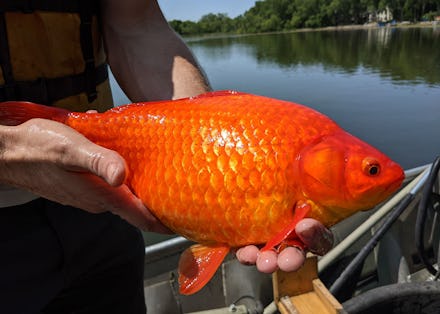Goldfish are often (and unfortunately) given away as prizes at fairs and carnivals, but here's an instance of a goldfish serving as the reward for everybody's favorite challenge: "Play stupid games, win stupid prizes." The city of Burnsville, Minnesota, is begging its residents and pet shop owners to stop dumping goldfish into its lakes and waterways. The reason? The fish don't just die when you flush them. Instead, they can thrive in the unfamiliar habitat, growing to be ridiculously massive and thus disrupting natural ecosystems.
"Please don't release your pet goldfish into ponds and lakes!" The city that sits just south of Minneapolis pleaded on its official Twitter account. "They grow bigger than you think and contribute to poor water quality by mucking up the bottom sediments and uprooting plants."
To highlight just what can happen when goldfish get sent out into the wild, the city included several photos of the freed fish that were pulled from local lakes. In an interview with The Washington Post, Burnsville’s natural resources specialist, Caleb Ashling, said that these fish were "about the size of a football."
Goldfish are a member of the carp family, and in the right conditions, they can not only survive but thrive. These freshwaster swimmers can grow to be over a foot long and weigh several pounds. The largest goldfish, according to Guinness World Records, measured in at 18.7 inches, which is entirely too big for a goldfish.
While it's certainly a novel thought for humans that a fish that we usually think of as a tiny bowl-dweller can grow to be a foot and a half long, it's not quite so entertaining for other organisms. Goldfish tossed into large bodies of water can reproduce and become invasive species that throw off the balance of just about everything. They are resilient creatures, capable of surviving cold winters and growing their brood, which puts new pressures on the ecosystem. They take up valuable food resources, leaving less for others. They also have a habit of stirring up the bottom of the lake, which can cause the waters to become muddy and can destroy plant populations.
The massive fish pulled from Minnesota lakes may seem like an outlier, but the problem of dumped goldfish is more prevalent than you'd think. Several states, including Virginia and Washington, have warned people not to toss goldfish into waterways. Australia and Canada have also had to warn citizens about disposing of unwanted pet fish this way. In 2017, officials in Lake Tahoe had to pull thousands of goldfish from the water because they had started to damage the lake's ecosystem. Last year, more than 50,000 goldfish got removed from Minnesota's Big Woods Lake.
Part of the problem is the simple abundance of goldfish. More than 200 million of the creatures are bred every single year and sent to pet shops across the globe. While they make for good pets, they are also too often thought of as short-term or disposable companions that people simply aren't that attached to. Folks who are setting their fish free in the lake might think they are doing the humane thing, but it's actually causing damage to the environment — especially when it seems that many people have the same instinct and are filling lakes with unwanted fish.
Instead of dumping your goldfish, the U.S. Fish and Wildlife Service recommends putting it up for adoption. If that isn't an option, contact a local veterinarian or other pet care service that may be able to help you figure out a way to rehome or dispose of the fish in a humane way. Whatever you do, do not try to have a Free Willy moment with your goldfish, because you're going to do more harm than good.
